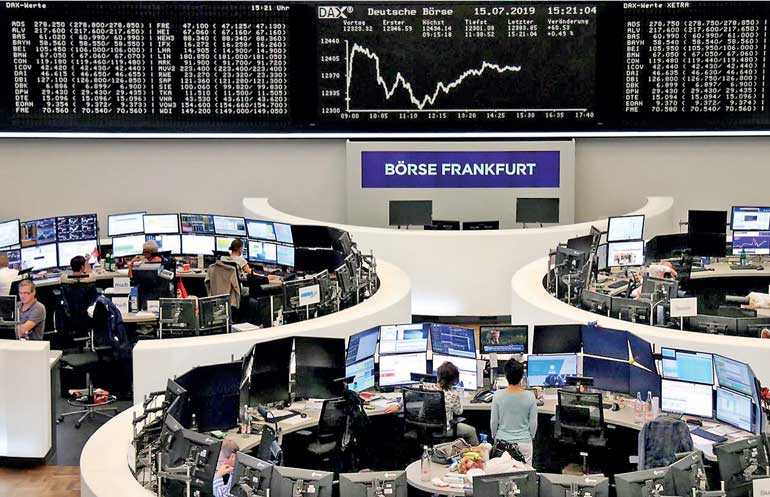Thursday Feb 19, 2026
Thursday Feb 19, 2026
Wednesday, 17 July 2019 00:00 - - {{hitsCtrl.values.hits}}

LONDON (Reuters): Darkening German investor morale and fresh Brexit woes cast a shadow over European markets on Tuesday, with German benchmark bond yields coming under pressure and the pound plunging to six month-lows against the euro.
Germany's ZEW indicator showed that the mood among investors in Europe's largest economy deteriorated more than expected in July, with the survey pointing to the unresolved China-US trade dispute and to political tensions with Iran.
The report knocked Germany's 10-year bond yield deeper into negative territory at minus 0.316%, while Germany's main stocks index nudged into the red. European markets struggled for direction with the pan-region Stoxx 600 treading water.
The underlying picture was more mixed, with gains in airline and healthcare stocks offsetting losses in telecoms and automotives as the earnings seasons gets underway.
Asian markets fared better. MSCI's Asia-Pacific ex-Japan index gained 0.3% as gains in South Korea and Taiwan offset losses in China's blue-chip CSI300 index. China was still smarting from Monday's tepid growth data, which showed the toll the Sino-US trade war is taking, even as new data highlighted Beijing's efforts to boost spending.
In equity markets, much of the focus was shifting to the United States, where futures pointed to a flat opening. Heavyweights JPMorgan, Goldman Sachs and Wells Fargo are all due to report earnings.
Markets also await US retail sales data – expected to show a 0.1% rise in June. That comes ahead of major central bank decisions, with the European Central Bank due on 25 July and the Federal Reserve expected to deliver a US rate cut shortly thereafter.
Citigroup's results on Monday provided markets with a taste. A decline in net interest margin in its mixed quarterly report underlined risks for financial firms in a lower interest rate environment. That decline partly overshadowed better-than-expected profit, triggering a fall in shares of other banks on concerns that it would presage lower profits across the industry.
The fallout from trade tensions has also cast a cloud. Overnight, US President Donald Trump showed no signs of softening his stance on China, warning Washington could ramp up pressure as trade talks sputtered along.
That has reinforced expectations of central bank policy easing. Markets have fully priced in a 25-basis-point cut by the Fed at its meeting at the end of this month.
In currency markets, the pound sank to a six-month low against the euro after a debate between the two candidates to become Britain's next prime minister re-ignited worries about a no-deal Brexit.
Against the euro, the pound slipped to 90.225 pence. It reached a six-day low against the dollar at $1.2463.
Labour market data did little to soften the blow, showing potential signs of future weakness in jobs growth, even though wages have grown at their fastest pace in more than a decade.
Elsewhere, the dollar was up 0.1% against the yen at 108.01 while the euro bought $1.1244.
The dollar index, which tracks the dollar against a basket of six major currencies, was a touch stronger at 97.063.
Elsewhere in fixed income markets, the yield on benchmark 10-year Treasury notes turned higher to 2.0973% while the two-year yield, closely watched as a gauge of traders' expectations for Fed fund rates, rose to 1.8416%.